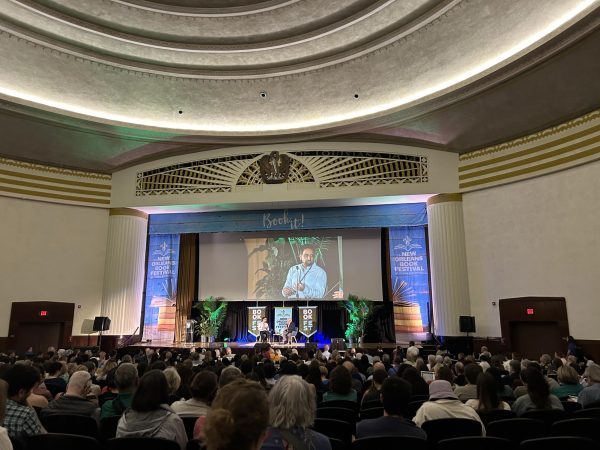
The third day of the New Orleans Book Festival at Tulane University began with a packed Kendall Cram Auditorium. Overflow attendees lined the walls of the room to see Kurt Andersen and Lawrence O’Donnell discuss Donald Trump’s ascendancy to the presidency.
Andersen and O’Donnell spoke about the conditions that made Trump’s presidency possible.
One of these conditions, O’Donnell said, was a cultural shift against the trait of humility towards ego and self-promotion. Then, it was the induction of reality TV that launched Trump’s character. Andersen referred to how this narcissism inflected everything: “show business became a part of every business.”
Fox News’s creation in 1996 and Sarah Palin’s selection as a vice presidential nominee in 2008 were “various tears in the fabric of culture,” Andersen said, that led to Trump’s presidency.
In the following time block, Sal Khan, the founder of Khan Academy, sat with Walter Isaacson on the Ford Foundation Stage in McAlister Auditorium to discuss the future of online education amidst artificial education.
The educators discussed the possibility of generative AI increasing the accessibility of education, essentially giving every student with computer access a one-on-one education. Khan said Khan Academy’s new AI tutor, Khanmigo, can be an “on-demand” tutor for students.
“I’m [from] a computer science background and [Khanmigo] is a better tutor,” Khan said. “When I see my own kids use it, [Khanmigo] is far more patient.”
Filmmaker Ken Burns moderated a panel with historians Heather Cox Richardson and Jeffrey Rosen, who analyzed how America’s founding documents provide perspectives of issues today.
In the Declaration of Independence, they said, the contrast between egalitarian principles and slavery would drive almost a century of turmoil.
The panelists said this contrast between American ideas and actions continues today.
“The American [Revolutionary] war is over,” Richardson said. “The American Revolution is still going on.”
Politician and author Stacey Abrams sat down with television anchor and screenwriter Lawrence O’Donnell to discuss Abrams’s latest fictional political novel, “Rogue Justice.”
Abrams said her book’s inspiration came from the idea that the constitution doesn’t advise what to do when a supreme court justice is unable to do their job.
Abrams started writing her book more than a decade ago but no one believed the fictional events described could be reality until the 2020 election.
O’Donnell, as a screenwriter for the fictional political TV series, “The West Wing,” said he too has seen reality catch up with fiction.
Burns and Isaacson spoke about Burns’s current project, a documentary about the curiosity of Leonardo da Vinci. Following their discussion, audience members enjoyed an extended preview of the new film.
Burns said his fascination with da Vinci stems from the artist’s wonder for learning and his scientific approach to art in a way that “speaks directly to the questions that animate us [as humans].”
Isaacson and Burns also discussed the cinematic elements of da Vinci’s most famous paintings.
“Certainly in The Last Supper it’s almost like a Ken Burns documentary,” Isaacson said. “It’s moving.”
Closing out the day’s events, authors Emmeline Clein and Lisa Wade discussed how social media shapes self-image in a conversation surrounding disordered eating and hookup culture on college campuses.
Clein said that social media has been demonized as a space young women use to reinforce disordered eating, but it is also a space for people that have been rejected from traditional treatment spaces to find validation and help.




Leave a Comment